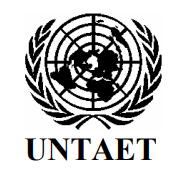
The United Nations Transitional Administration in East Timor, was a United Nations mission in East Timor that aimed to solve the decades-long East Timorese crisis in the area occupied by Indonesian military. UNTAET provided an interim civil administration and a peacekeeping mission in the territory of East Timor, from its establishment on 25 October 1999, until its independence on 20 May 2002, following the outcome of the East Timor Special Autonomy Referendum. The transitional administration was established by United Nations Security Council Resolution 1272 in 1999.

The United Nations Mission of Support to East Timor (UNMISET) lasted from 20 May 2002 to 20 May 2005, when it was replaced by United Nations Office in Timor Leste (UNOTIL). It was established when East Timor became an internationally recognised independent state and the United Nations Transitional Administration in East Timor (UNTAET) came to an end.

The United Nations Office in Timor-Leste (UNOTIL) supported the capacity development of critical state institutions, including the East Timor National Police (PNTL) in order to strengthen democratic governance and to help further build to peace in East Timor. A UN Police Force of Technical Advisers continues to provide the country's police, Policia Nacional de Timor-Leste (PNTL), with specialized training for rapid response and intervention units. The Technical Advisers are also responsible for providing training in specialized areas such as counter-terrorism, forensics, and transferring management skills to the national police in all districts of Timor-Leste.

A United Nations Military Observer (UNMO) is a military official deployed by the United Nations to provide support to a UN mission or peace operation. Described as the "eyes and ears" of the UN Security Council, observers fulfill a variety of roles depending on scope, purpose, and status of the UN mission to which they are attached. A UNMO is generally tasked with monitoring and assessing post-conflict agreements, such as a ceasefire or armistice; the withdrawal of military forces; or the maintenance of a neutral buffer zone. Observers usually undergo special training to ensure neutrality, diplomacy, and deescalation techniques.
The Serious Crimes Unit was the official title given to an elite unit of International Police investigators during the United Nations 1999 to 2004 mission in East Timor.

The United Nations Integrated Mission in East Timor (UNMIT) was established on 25 August 2006 by UN Security Council Resolution 1704. Its objectives are "to support the Government in consolidating stability, enhancing a culture of democratic governance, and facilitating political dialogue among Timorese stakeholders, in their efforts to bring about a process of national reconciliation and to foster social cohesion". In its most recent resolution on UNMIT, the Council extended its mandate until 26 February 2012. UNMIT and ISF troops left the country at the end of 2012.

The United Nations Assistance Mission for Iraq (UNAMI) was formed on 14 August 2003 by United Nations Security Council (UNSC) Resolution 1500 at the request of the Iraqi government to support national development efforts.

United Nations Security Council resolution 1272 was adopted unanimously on 25 October 1999, after recalling previous resolutions on East Timor, particularly resolutions 384 (1975), 389 (1976), 1236 (1999), 1246 (1999), 1262 (1999) and 1264 (1999). The council established the United Nations Transitional Administration in East Timor (UNTAET) that was responsible for the administration of the territory until its independence in 2002.

United Nations Security Council resolution 1410, adopted unanimously on 17 May 2002, after recalling previous resolutions on East Timor (Timor-Leste), particularly resolutions 1272 (1999), 1338 (2001) and 1392 (2002), the council established the United Nations Mission of Support to East Timor (UNMISET) to replace the United Nations Transitional Administration in East Timor (UNTAET).
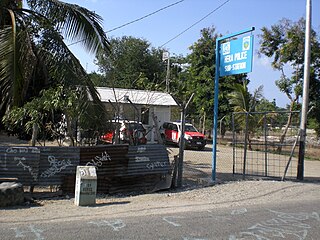
United Nations Security Council resolution 1473, adopted unanimously on 4 April 2003, after recalling previous resolutions on East Timor (Timor-Leste), particularly Resolution 1410 (2002), the Council adjusted the United Nations Mission of Support to East Timor (UNMISET) to improve its capacity to train the National Police of East Timor in light of the security situation, and slowed the downsizing of the operation.

United Nations Security Council resolution 1480, adopted unanimously on 19 May 2003, after reaffirming previous resolutions on East Timor (Timor-Leste), particularly resolutions 1410 (2002) and 1473 (2003), the council extended the mandate of the United Nations Mission of Support to East Timor (UNMISET) for a period of twelve months until 19 May 2004.

United Nations Security Council resolution 1543 was adopted unanimously on 14 May 2004, after reaffirming previous resolutions on East Timor (Timor-Leste), particularly resolutions 1410 (2002), 1473 (2003) and 1480 (2003). The Council extended the mandate of the United Nations Mission of Support to East Timor (UNMISET) for six months, with a view to extending it for a further final period of six months until 20 May 2005.

United Nations Security Council resolution 1573, adopted unanimously on 16 November 2004, after reaffirming previous resolutions on East Timor (Timor-Leste), particularly resolutions 1410 (2002), 1473 (2003), 1480 (2003) and 1543 (2004), the Council extended the mandate of the United Nations Mission of Support to East Timor (UNMISET) for a final six months until 20 May 2005.
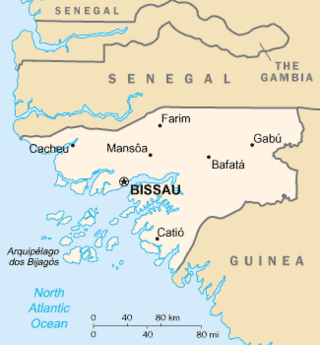
United Nations Security Council resolution 1580, adopted unanimously on 22 December 2004, after reaffirming resolutions 1216 (1998) and 1233 (1999) on the situation in Guinea-Bissau, the Council extended the mandate of the United Nations Peacebuilding Support Office in Guinea-Bissau (UNOGBIS) for a further period of one year and revised its operations. It was the final Security Council resolution adopted in 2004.
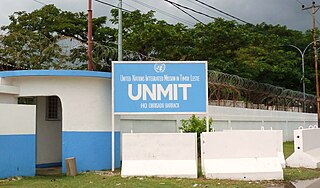
United Nations Security Council Resolution 1969 was adopted unanimously on February 24, 2011; after reaffirming resolutions 1599 (2005), 1677 (2006), 1690 (2006), 1703 (2006), 1704 (2006), 1745 (2007), 1802 (2008), 1867 (2009) and 1912 (2010) on the situation in East Timor (Timor-Leste), the Council decided to extend the mandate of the United Nations Integrated Mission in Timor-Leste (UNMIT) for a year, until February 26, 2012.

United Nations Security Council Resolution 1677, adopted unanimously on May 12, 2006, after reaffirming previous resolutions on East Timor (Timor-Leste), particularly Resolution 1599 (2005), the Council renewed the mandate of the United Nations Office in Timor-Leste (UNOTIL) until June 20, 2006.

United Nations Security Council Resolution 1690, adopted unanimously on June 20, 2006, after reaffirming previous resolutions on East Timor (Timor-Leste), particularly resolutions 1599 (2005) and 1677 (2006), the Council renewed the mandate of the United Nations Office in Timor-Leste (UNOTIL) for two months until August 20, 2006.
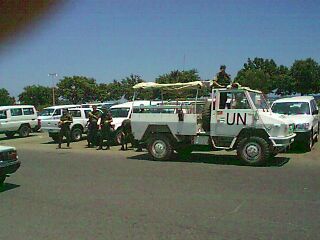
United Nations Security Council Resolution 1703, adopted unanimously on August 18, 2006, after reaffirming previous resolutions on East Timor (Timor-Leste), particularly resolutions 1599 (2005), 1677 (2006) and 1690 (2006), the Council renewed the mandate of the United Nations Office in Timor-Leste (UNOTIL) until August 25, 2006.

United Nations Security Council Resolution 1704, adopted unanimously on August 25, 2006, after reaffirming previous resolutions on East Timor (Timor-Leste), particularly resolutions 1599 (2005), 1677 (2006), 1690 (2006) and 1703 (2006), the Council established the United Nations Integrated Mission in East Timor (UNMIT) for an initial period of six months.
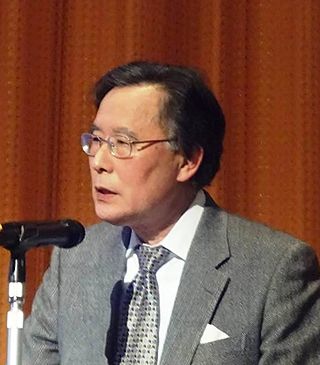
Sukehiro Hasegawa is a Japanese academic, educator, author and administrator. He served as the Special Representative of the Secretary-General of the United Nations for Timor-Leste and head of peacekeeping and peacebuilding missions, UNMISET, UNOTIL and UNMIT from May 2004 to September 2006. He is currently the President of the Global Peacebuidling Association of Japan, the ACUNS Liaison Officer in Tokyo, the Chair of the Hiroshima Peacebuilders Center (HPC) Council and the Personal Advisor to former president and Prime Minister José Ramos-Horta of Timor-Leste.















